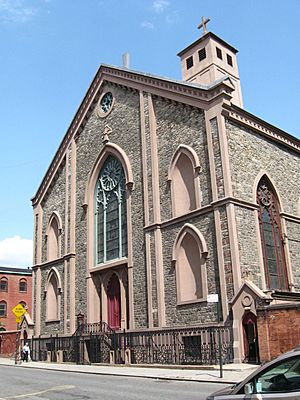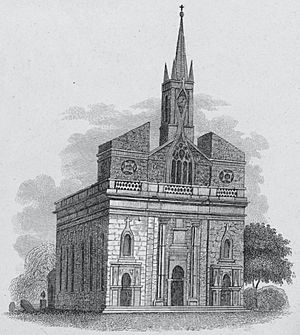St. Patrick's Old Cathedral facts for kids
Quick facts for kids St. Patrick's Old Cathedral |
|
|---|---|

Mulberry Street facade
|
|
| 40°43′25″N 73°59′43″W / 40.72361°N 73.99528°W | |
| Location | Mulberry Street, Manhattan, New York City |
| Country | United States |
| Denomination | Catholic Church |
| Tradition | Latin Church |
| History | |
| Status | Minor basilica, former cathedral |
| Dedication | May 14, 1815 |
| Architecture | |
| Architect(s) | Joseph-François Mangin |
| Style | Gothic Revival |
| Groundbreaking | 1809 |
| Completed | 1815 |
| Administration | |
| Deanery | South Manhattan |
| Archdiocese | Archdiocese of New York |
The Basilica of Saint Patrick's Old Cathedral, often called St. Patrick's Old Cathedral, is a Catholic church in New York City. It is located in the Nolita neighborhood of Lower Manhattan. This church was once the main church, or cathedral, for the Roman Catholic Archdiocese of New York.
The church was built between 1809 and 1815. It was designed by Joseph-François Mangin in the Gothic Revival style. It served as the archdiocese's main church until the new St. Patrick's Cathedral opened in 1879. Today, church services are held in English, Spanish, and Chinese. The church is at 260–264 Mulberry Street. Its main entrance is on Mott Street.
Old St. Patrick's is now a minor basilica, a special title given by the Pope. It was named a New York City landmark in 1966. The whole church complex was added to the National Register of Historic Places in 1977.
Contents
History of Old St. Patrick's Cathedral
New York City's first Catholic church was St. Peter's on Barclay Street, built in 1785. By the early 1800s, the city's Catholic population was growing fast. A Jesuit priest named Anthony Kohlmann realized they needed a second church. They also needed a cathedral for the first bishop, as New York became a bishop's city in 1808.
The chosen spot for the new church was a cemetery for St. Peter's. It was outside the city, surrounded by farms. The architect was Joseph-François Mangin, who also helped design New York City Hall. Construction began on June 8, 1809. The church was finished and dedicated on May 14, 1815.
In 1815, John Connolly, an Irish friar, became New York's first bishop. When it was built, St. Patrick's Old Cathedral was the largest church in the city. It measured 120 feet long and 80 feet wide. The inside ceiling was 85 feet high.
St. Patrick's Day Parades
Until 1830, New York's yearly St. Patrick's Day parade ended at this cathedral. Later, the parade moved to other locations. Eventually, it moved uptown to pass by the new St. Patrick's Cathedral, which opened in 1879.
Protecting the Cathedral
In 1836, there was an attempt to attack the cathedral. Tensions were high between Irish Catholics and groups who were against Catholics. The church's outer walls, built in 1834, had small openings cut into them. These openings were used to defend the building with muskets from rioters. After this event, the Ancient Order of Hibernians set up their main office across the street.
Important Events and People
In 1838, the funeral for Lorenzo da Ponte was held at the cathedral. He was a famous writer who wrote the words for many of Mozart's operas. He moved to America and became a professor at Columbia University. He also helped start what became the Metropolitan Opera. Many people attended his funeral.
On October 13, 1859, a very fancy wedding took place here. Don Esteban Santa Cruz de Oviedo, a rich Cuban landowner, married Frances Amelia Bartlett. The newspapers called it "The Diamond Wedding" because of the expensive gifts and preparations.
Fire and Rebuilding
On October 7, 1866, a fire started in a nearby shop and spread to the cathedral. The fire badly damaged the church. Even though the new St. Patrick's Cathedral was already being built, the old one was repaired. Architect Henry Engelbert led the restoration work. The first church service in the rebuilt cathedral was on April 1, 1867. The "new" Old Cathedral reopened in 1868.
Since the current St. Patrick's Cathedral opened in 1879, St. Patrick's Old Cathedral has served as a local parish church. The pastor lives in the old Bishop's House nearby. Today, the church serves many different groups of people.
Cathedral Complex Buildings
The area around St. Patrick's Old Cathedral includes other important buildings.
St. Patrick's Old Cathedral School
St. Patrick's Old Cathedral School is at 32 Prince Street, across from the cathedral. It was built in 1825–1826 as an orphanage for Catholic children. The Sisters of Charity ran it. In 1851, it became an orphanage just for girls. In 1886, it became St. Patrick's Convent and Girls School. Later, it became a school for both boys and girls again. This building is also a New York City landmark. The school closed in 2010, and the building was changed into apartments and offices.
Chancery Office Building
In 1859, a building called the Chancery Office Building was built next to the church. It was designed by James Renwick Jr. and William Rodrigue. They later designed the new St. Patrick's Cathedral. This building later became St. Michael's Chapel. From 1936 to 2019, it was St. Michael's Russian Catholic Church. Services from this church are now held at another church in Manhattan.
Catacombs and Burials
Underneath the basilica are catacombs, which are underground burial places. They have 35 family crypts and 5 vaults for priests. These catacombs are now open for new burials. The basilica also offers walking tours of the catacombs.
Many important people are buried here, including:
- John Connolly, the first bishop of New York.
- General Thomas Eckert.
- Members of the Delmonico restaurant family.
- Countess Annie Leary.
- Dominick Lynch, a well-known wine merchant.
- Congressman John Kelly.
Two people who might become saints, Pierre Toussaint and Father Isaac Hecker, were first buried here. Later, their remains were moved to other churches. The first mother superior of New York's Sisters of Mercy, Mary Agnes O'Connor, is also buried here.
The Erben Organ
The gallery of Old St. Patrick's Cathedral has a large pipe organ. It was built in 1868 by Henry Erben. This organ originally worked without electricity. When the new cathedral opened in 1879, this organ was mostly left as it was. In 2004, the Organ Historical Society called it an instrument of "exceptional historical merit." This means it is very important to history. The organ is still used for Sunday services and is waiting for more restoration work.
Images for kids
See also
 In Spanish: Antigua Catedral de San Patricio (Nueva York) para niños
In Spanish: Antigua Catedral de San Patricio (Nueva York) para niños








